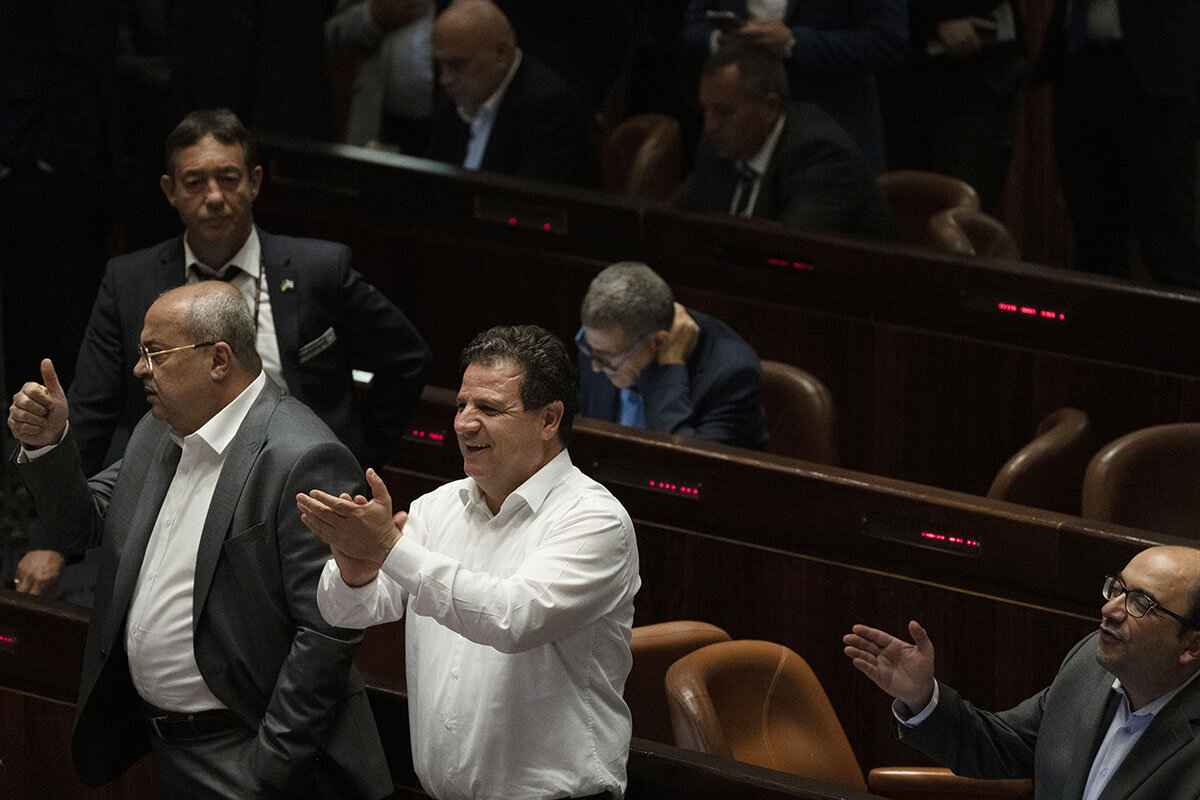Diverse Israeli coalition made history. But has it been a success?
Loading...
| TEL AVIV, Israel
This week was supposed to be celebratory for the Israeli government led by Prime Minister Naftali Bennett as it marked its first anniversary June 13.
The eight-party coalition that had toppled the long-serving Benjamin Netanyahu was the most diverse and unlikely in the country’s history – one of the “greatest experiments in global politics,” as a senior government official puts it.
Its ranks included ultranationalist right-wingers, pro-peace leftists, centrists, and, for the first time ever, an Arab Israeli political faction, all coming together to govern.
Why We Wrote This
A story focused onThe historically diverse Israeli government formed a year ago and now fraying was by definition a grand experiment in democratic cooperation. Is that enough to leave a positive legacy?
These disparate parts agreed on very little, save for replacing Mr. Netanyahu and avoiding yet another election cycle after four largely inconclusive ballots between 2019 and 2021. The parties vowed to focus on consensus domestic items like the economy, housing, and transportation, and avoid more politically charged issues like the conflict with the Palestinians and West Bank settlements.
And to an extent, say analysts and some government officials, it has been a success.
“The experiment over the past year has been whether a diverse coalition can work together, find compromises, and a common way forward ... as an antidote to increased polarization and populist nationalism,” says the senior government official, who requested anonymity. “In this sense it’s a resounding success.”
Yet the coalition now finds itself teetering.
After the government failed to pass a crucial parliamentary bill last week, Nir Orbach, from Mr. Bennett’s pro-settler Yamina party, appeared to snap.
“You don’t want to be partners; the experiment with you has failed,” he screamed in the Knesset at a coalition member from the Arab Israeli Ra’am faction who had voted against the bill. On Monday Mr. Orbach said he was leaving the government, but was giving it a week to pass the measure before he would vote to topple it.
The coalition’s slim one-seat majority in parliament had already been wiped out after another key lawmaker from Mr. Bennett’s party defected to the opposition in April. Recent weeks have seen other coalition backbenchers threaten to defect or openly vote against the government.
Most analysts now believe snap elections are just a matter of time, and could possibly be called in the coming weeks.
Lasting change
But even if the government falls, does that mean the grand experiment failed? Some argue it may have forever changed Israel’s politics.
The latest crisis was due to emergency legislation that for decades had been routinely passed every five years, extending Israeli civil law to settlers living in the occupied West Bank. Two Arab Israeli coalition lawmakers, from Ra’am and the leftist party Meretz, voted against the bill, scuttling passage and drawing the ire of Mr. Orbach and other ultranationalists (no matter that a parliamentary majority was uncertain even if the two had voted in favor).
“There is no way not to come to the conclusion that a stable coalition can only happen when it relies on Zionists who served in the army,” Communications Minister Yoaz Hendel, of the right-wing New Hope faction, told party activists over the weekend. “There is a wider meaning to this than just the possible toppling of a government.”
But among Arab Israeli analysts and voters, as indicated by recent polls, there is a sense that increased political participation, and cooperation with Jewish factions, are becoming the new normal. That there is no going back.
Government leaders have attempted to project business as usual amid the turmoil, vowing to fight on and highlighting the many accomplishments of the “government of national salvation,” as they’ve come to describe it.
“We are not giving up on our country. We are not giving up on the possibility of cooperation between people who have different views, who love this country to the same degree,” Mr. Bennett told his Cabinet Sunday.
Attacks by Netanyahu
The formation of the current government was highly acrimonious from the start. Mr. Bennett’s decision to break from Mr. Netanyahu and partner with leftist and Arab parties was slammed by his base as a deep betrayal.
Mr. Netanyahu and his supporters have for the past year consistently tarred the prime minister as a “cheat” and a “liar,” calling the government illegitimate. Opposition rallies have demanded that a “Jewish government” be returned to power and that cooperation with “terrorist supporters” – that is, the Islamist Ra’am party – be halted immediately.
This Netanyahu-led “poison machine,” as Mr. Bennett calls it, has ensured that Israel remains a deeply divided and polarized country. Mr. Netanyahu is still the most popular politician nationally, and his Likud party, too, leads in all polls.
The fear expressed by government officials is that in any snap election, the Likud and its traditional far-right and ultra-Orthodox political allies may succeed in winning an outright parliamentary majority.
Mr. Bennett has therefore framed the choice now facing the country as similar to last year’s: “to move forward with a functioning state, or to descend again into chaos, internal hatred, external weakness, and the enslavement of the state to the needs of one man,” as he wrote in a recent pamphlet to the public, alluding to Mr. Netanyahu’s ongoing corruption trial and extralegal efforts to quash the charges.
Analysts credit the government with returning a modicum of normalcy to the political system, including passing a state budget after several years of instability, expanding diplomatic ties with neighboring Arab states, and soberly managing the country’s security challenges.
“The executive branch has actually been working really well – the various ministers are coordinated with each other, they give credit to each other, and they’re eager to prove to the public that they can make a difference,” says Tal Schneider, chief political correspondent for The Times of Israel.
Yet the government’s mere existence appears to be its biggest triumph.
“Even if this government falls, it was a historic year and a huge achievement, perhaps even a miracle,” Ms. Schneider adds. “In particular, breaking this taboo of bringing an Arab party into a ruling coalition. It’s bigger than anything else that has happened here over the past year.”
For Arab citizens, a historic shift
Arab citizens of Israel, 20% of the population, had never before been represented in government by an independent political faction, due to opposition from both their own politicians and the broader Jewish Israeli public.
Ra’am’s leader, Mansour Abbas, changed all that by first openly negotiating with Mr. Netanyahu and then striking a deal with Mr. Bennett and Foreign Minister (and alternate prime minister) Yair Lapid to join their coalition.
Mr. Abbas has over the past year condemned Palestinian attacks on Israelis and publicly recognized Israel as a Jewish state. In turn, the militant Hamas group has called him a traitor to the Palestinian cause, as have his opponents from competing Arab Israeli factions.
“Parallel steps [by both Arab and Jewish societies], this is the philosophy of our approach,” Mr. Abbas explained last week in an address to Reichman University in central Israel. “We’re not waiting for the change in order to say afterwards that we’re creating Arab-Jewish partnership. ... We’ve created the partnership despite all the differences and all the history and [competing] narratives. ... Through this partnership we’re creating the change.”
The Arab Israeli public appears to be highly supportive of this approach, with one recent survey showing nearly 70% approving of Arab political representatives joining a governing coalition.
Mr. Abbas has been adamant that this “experiment” in Arab-Jewish partnership has been a success, despite the naysayers within the coalition.
Arab Israeli officials and analysts, for their part, dispute the characterization of the political crisis as originating with Ra’am or other left-wing parliamentarians.
“Factually, over the past year, you can see votes by them in favor of what are termed ‘nationalistic’ or ‘security’ bills that clearly went against their morals and ideology,” says Mohammad Magadli, a prominent commentator for Israel’s Channel 12 News.
“Can’t turn back the wheel”
But even if the government were now to fall, he adds, there will be no going back – by either side.
“After this recent period of crisis, with all the political turmoil, terror attacks, and unrest at [Jerusalem’s] Al-Aqsa Mosque, you still have a majority of Arab Israelis in favor of further integration in national politics,” Mr. Magadli says.
“And for Israeli society – if not the world – its entire approach to the Arab Israeli community has changed. The moment you get to know something, you can’t turn back the wheel. It’s a change in the whole social and political status of Israel’s Arab citizens.”
The vitriolic opposition to any such change from many quarters of Jewish Israeli society is unsurprising, adds the senior government official.
“Any change of this magnitude takes time and brings about resistance,” the official says. “If we left politics tomorrow, it would still be the most important thing we’ve done. But we’re not leaving politics tomorrow.”







